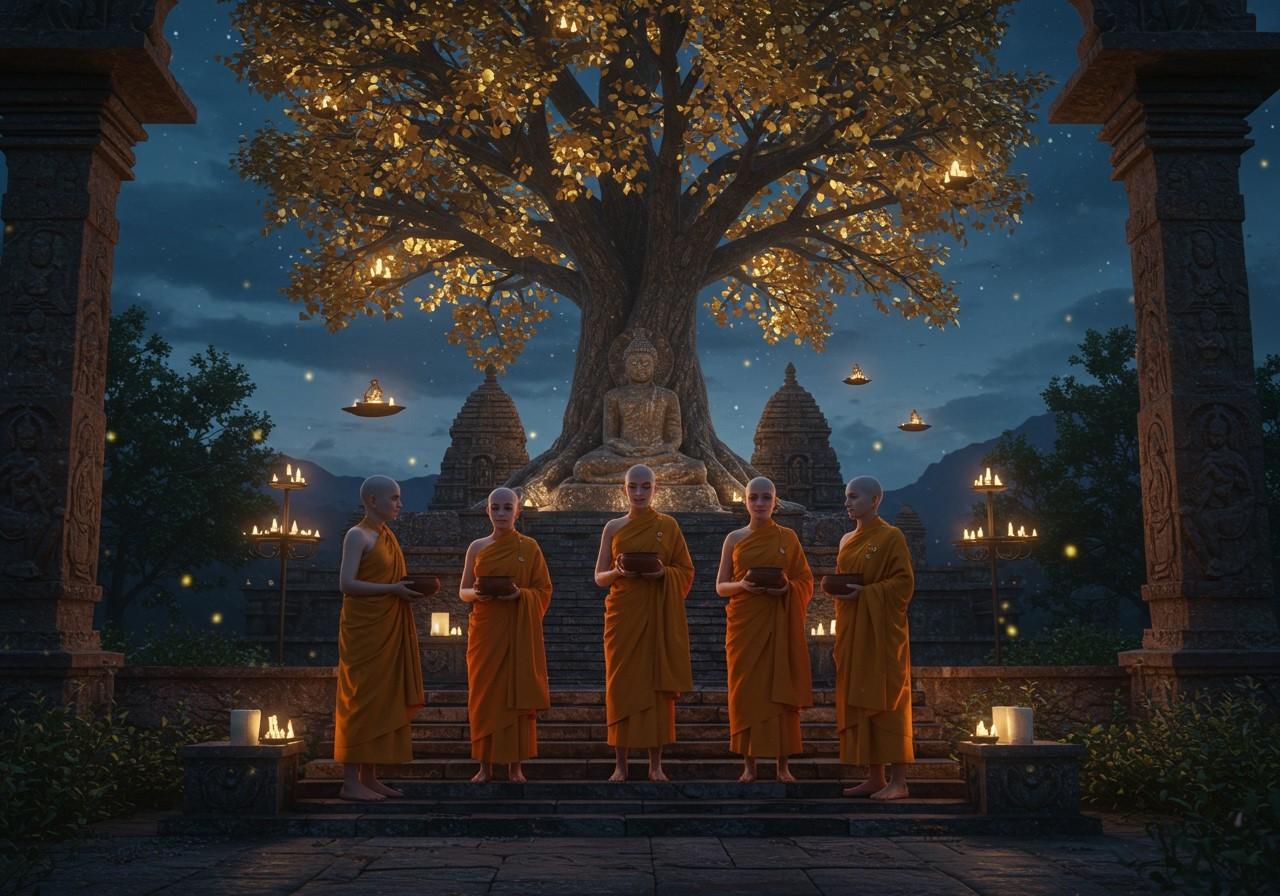
Bhikkhunis, the ordained female monastics of Buddhism, hold a significant place in the spiritual tradition. Their history, marked by both triumphs and challenges, offers valuable insights into the evolution of Buddhism and the role of women within it. Exploring their journey is essential for appreciating the rich tapestry of Buddhist heritage.
The Dawn of the Bhikkhuni Sangha
In ancient India, a society largely defined by patriarchal structures, the emergence of the Bhikkhuni Sangha marked a pivotal moment. Women’s status was often limited, and initially, the Buddha hesitated to establish a female monastic order. It was Mahapajapati Gotami, the Buddha’s aunt and foster mother, whose persistent appeals and unwavering determination paved the way for the Bhikkhuni Sangha’s creation. This development played a crucial role in expanding access to spiritual practice.
Mahapajapati Gotami: A Pioneer of Female Monasticism
Mahapajapati Gotami’s life is a testament to her strength and spiritual devotion. Her close relationship with the Buddha, combined with her deep commitment to the Dharma, led her to champion the cause of female ordination. Despite facing considerable resistance, she successfully established the Bhikkhuni Sangha, becoming the first Bhikkhuni and enabling countless women to follow the path of monasticism.
The Path to Ordination: Rules and Practices for Bhikkhunis
The ordination process for Bhikkhunis involves specific precepts and guidelines outlined in the Vinaya Pitaka, the collection of monastic rules. The Eight Garudhammas, unique precepts for nuns, serve to maintain the harmony and integrity of the monastic community. While the ordination procedures for Bhikkhunis and Bhikkhus (male monks) share similarities, there are also distinctions reflecting the social context of the time.
The Enduring Contributions of Early Bhikkhunis
From teaching the Dharma to practicing meditation and engaging in community service, early Bhikkhunis played a multifaceted role in the growth and flourishing of Buddhism. Figures like Khema and Uppalavanna, renowned for their wisdom and spiritual attainments, stand as examples of the profound impact Bhikkhunis had on the tradition. Their verses in the Therigatha, a collection of poems by elder nuns, provide a glimpse into their spiritual experiences and contribute significantly to Buddhist literature.
Navigating Challenges: The Resilience of Bhikkhunis
The journey of Bhikkhunis has not been without its obstacles. They faced societal prejudices, internal monastic disputes, and periods of decline in different parts of the Buddhist world. Despite these challenges, their resilience and dedication to the Dharma have ensured the continuation of the Bhikkhuni lineage.
The Continuing Legacy of Bhikkhunis in the Modern Era
The legacy of the first Bhikkhunis continues to shape modern Buddhist practice. The Bhikkhuni Sangha has experienced revivals in various regions, including Sri Lanka, Thailand, and India. Contemporary Bhikkhunis play a vital role in promoting gender equality within monastic communities and contributing to the global spread of Buddhist teachings.
Poojn.in: Supporting Your Buddhist Practice
Poojn.in, India’s leading provider of spiritual and ritual supplies, offers a wide range of products to support your Buddhist practice and connect you with the rich heritage of Bhikkhunis. Our collection includes:
- Ghee: Pure ghee for use in traditional lamps and offerings, crafted according to ancient recipes.
- Gulab Jal (Rose Water): Premium rose water for purification rituals and creating a serene atmosphere during meditation.
- Pancha Sasya (Five Grains): A blend of five sacred grains used in various Buddhist ceremonies and offerings.
- Tulsi Mala: Prayer beads crafted from Tulsi wood, known for its spiritual significance, to aid in meditation and mantra recitation.
- Meditation Cushions and Mats: High-quality cushions and mats to provide comfort and support during meditation practice, promoting mindful awareness.
Visit www.poojn.in to explore our complete collection and discover resources to enhance your spiritual journey.
Honoring the Bhikkhuni Lineage
The story of the first Bhikkhunis is a testament to the power of perseverance and the pursuit of spiritual liberation. By acknowledging their contributions and understanding their historical context, we gain a deeper appreciation for the diversity and resilience of the Buddhist tradition. As documented in texts like the Therigatha (composed around 300 BCE) and the Apadana, the experiences and spiritual accomplishments of these pioneering women continue to inspire practitioners today.


